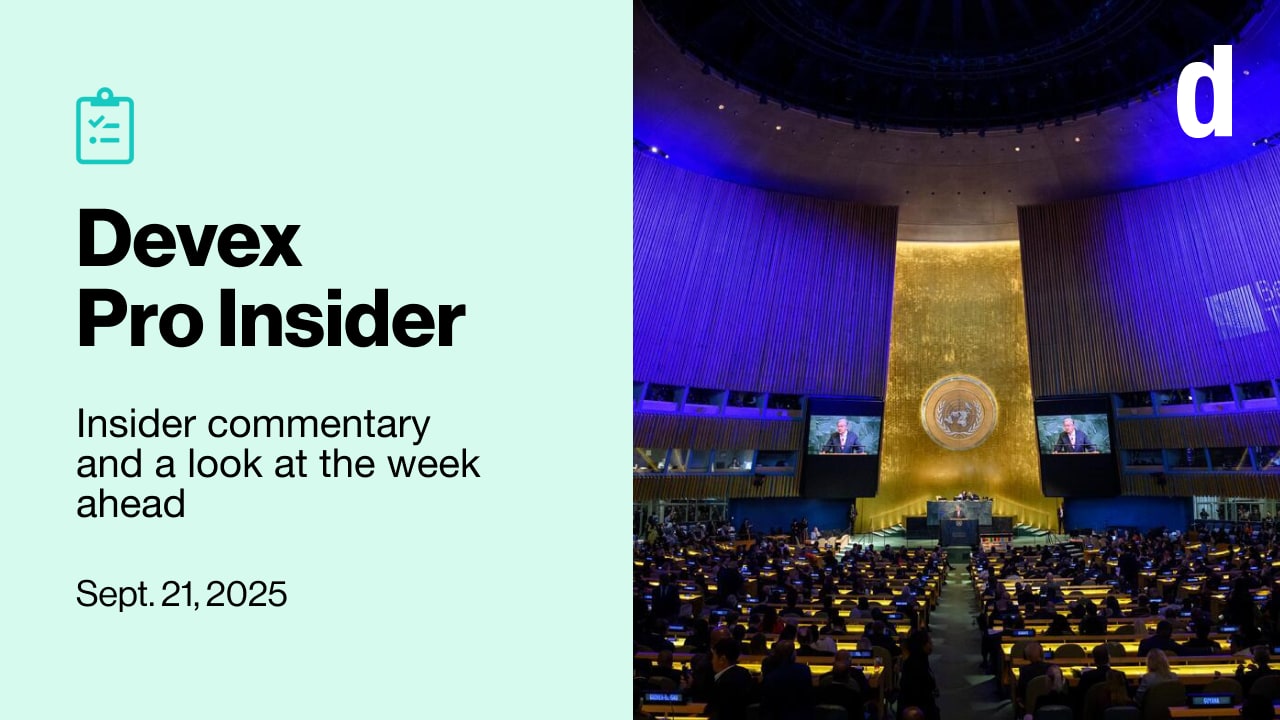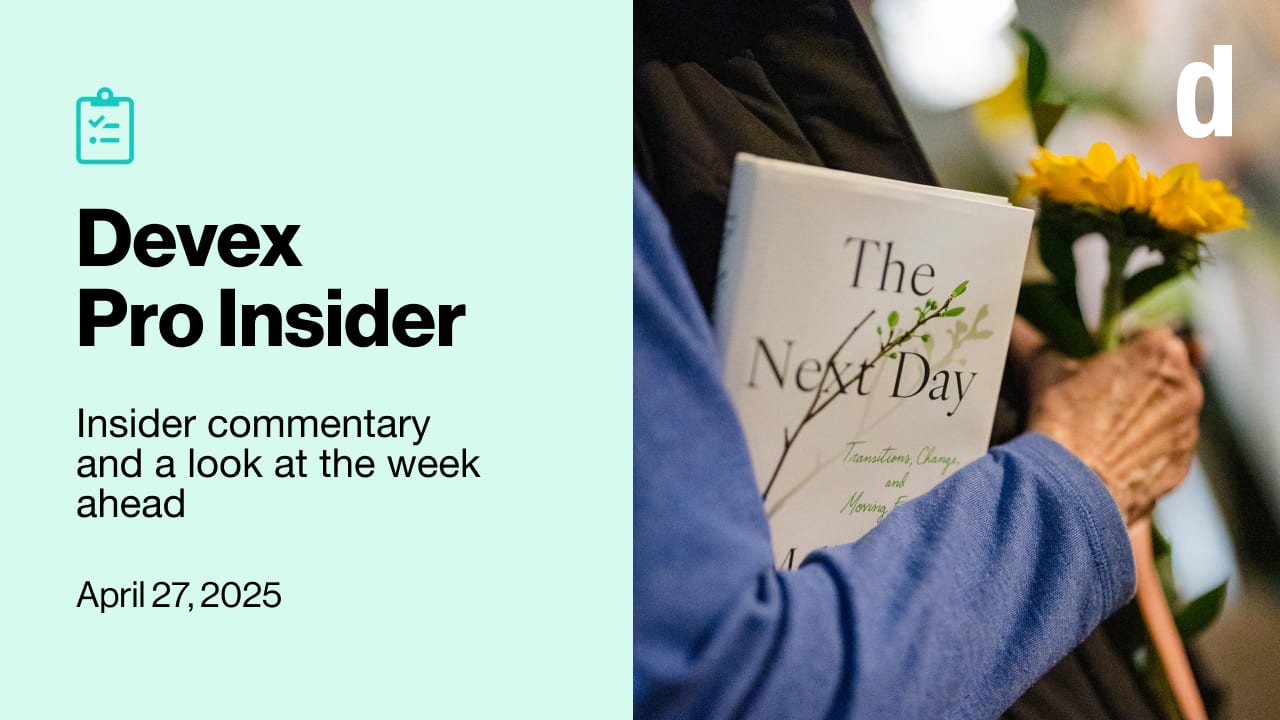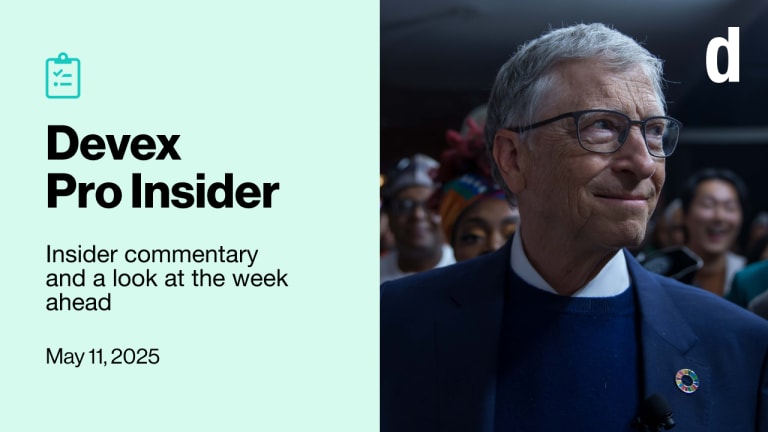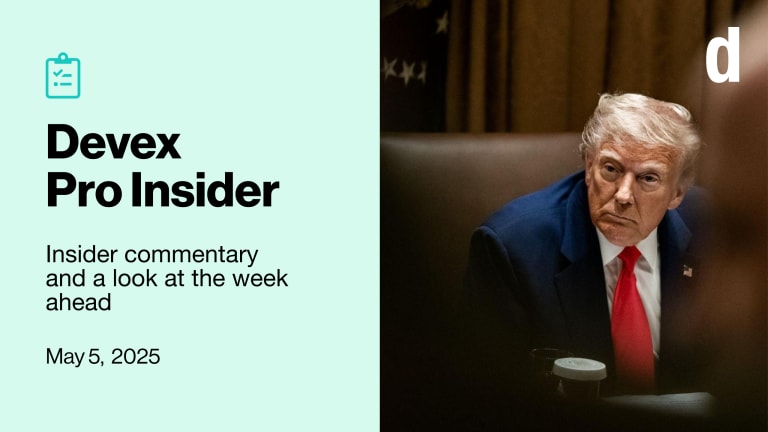Devex Pro Insider: Gates finally gets political, and Grindr for Equality has a new boss
A new global health partnership; the U.K. development minister's response on debt relief; and who might Bill Gates be supporting in the U.S. elections?
Thank you to everyone who joined us at Devex World last week! From our flash talks to workshops, it was a wonderful event. If you weren’t able to make it in person, don’t worry — we’ll be releasing recordings and write-ups for our Pro members. Meanwhile, the high-level sessions of the World Bank annual meetings are continuing as I write this newsletter — keep an eye out this week as my colleagues bring you all the important updates from the ground. After that, we’re entering into a week of relative calm before the U.S. election, which could be seismic for global development. We’re pulling together a group of experts to discuss the outcome and its consequences with our Pro members. Join us for the Devex U.S. election roundtable on Nov. 12. Coming up: Will you be at COP29 in Baku? Let us know! Get priority access to exclusive Devex events, networking, and coverage, or connect with our team on the ground. Also in today’s edition: Bill Gates on next week’s U.S. election, the U.K.’s development minister on debt relief, and a $500 million global health partnership. Bits and pieces This time it’s different. “Melinda French Gates gets political,” I reported in this newsletter back in August, covering news that the former wife of Bill Gates — who typically stays out of politics — had endorsed Joe Biden and was becoming more outspoken on politics after leaving the foundation her and her former husband founded together. Well, where she goes he follows, apparently, because it looks like Bill has now donated about $50 million to the Harris campaign. Still, he’s staying a little tighter-lipped about his political alignment and hasn’t endorsed anyone publicly. When approached by The New York Times about reports of the donation, he said: “I support candidates who demonstrate a clear commitment to improving health care, reducing poverty and fighting climate change in the U.S. and around the world. I have a long history of working with leaders across the political spectrum, but this election is different, with unprecedented significance for Americans and the most vulnerable people around the world.” He has apparently stressed in private conversations that he could work with either candidate. Opening the gates. Speaking of Gates, his foundation opened a new office in Dakar last week and also plans to finally open the doors to its new office in Nairobi on Nov. 11, almost exactly two years after it was first announced. Paulin Basinga, Africa director at the foundation, told Devex that the new regional offices will create “more opportunities for direct collaboration with governments and many partners” on the continent. Focus areas will include agriculture, health, immunization, nutrition, sanitation, financial services, gender equality, and family planning. The foundation has existing offices in Abuja, Addis Ababa, and Johannesburg. Skin in the game. As my colleague Rob Merrick reported, back in 2021, Anneliese Dodds, who is now the U.K.’s new development minister, publicly called on the then-Conservative government to change the law to support low-income countries struggling with debt. “The UK Government should stand up to the profiteers by changing the law that governs their debt,” Dodds wrote on Twitter, now X, also publishing her full letter on the subject to then-Chancellor of the Exchequer Rishi Sunak. The U.K. is considered to have unique leverage in this area, because 90% of debts owed by lower-income countries to private institutions — banks, hedge funds, and asset managers — are overseen by U.K. legal jurisdiction, according to the campaign group Debt Justice. But it’s easy to call for change from the sidelines. What about now that she’s in government herself? Last week, Rob had the chance to ask her directly, as she delivered a speech at Chatham House in London. But she wouldn’t (or couldn’t) repeat her previous position. While she did agree that “we need to be doing more” on the debt issue, she said “the most important thing initially … is to be using the mechanisms that we already have,” pointing to the G20 and Paris Club — the group of major creditor countries. Pro members can read more on this topic: Debt levels are high, but will solutions come through? Banding together. Finally, I wanted to flag a story from my colleague Elissa Miolene, who revealed that Population Services International and the Elizabeth Glaser Pediatric AIDS Foundation are coming together under a new umbrella group, HealthX Partners — a parent company that, beginning next January, will control a combined budget of nearly half a billion dollars. It’s not a merger, though. Apparently. The D.C.-based organizations will continue to operate independently, retaining their names, brands, and missions, but will be subsidiaries to HealthX Partners. Technical and programmatic staff will remain separate but they’ll share back-office functions such as human resources, accounting, and finance. “Given all the dynamics in the sector, the worst thing for any organization to do right now is nothing,” Karl Hofmann, PSI’s president, told Elissa. “We think a transnational, networked approach is a smart way to deliver value.” Pro members can read the full story to find out more. ✉️ Do you have insights into any of this week’s bits and pieces? Let me know by replying to this email. In memoriam Lola Adedokun, executive director of the Aspen Global Innovators Group, died last week. Adedokun had dedicated her career to global health, focusing on community-led innovations at Aspen, and previously on African health and children’s well-being at the Doris Duke Charitable Foundation. Aspen Institute President Daniel Porterfield described her as a “tireless champion for the needs of all. We will miss her care, her drive to make the world better through her work, and her friendship.” Richard Alan Cash, a lecturer in international health at Harvard, also died last week. He began his medical career in Bangladesh and was instrumental in improving oral rehydration therapy and making it accessible in the 1970s and 80s. In a statement, BRAC International said Cash had supported the organization from its infancy, serving as a board member and adviser. “Much will be written and said about his work, which has saved the lives of millions of children around the world,” said BRAC International Executive Director Shameran Abed. “Behind this extraordinary legacy was a most unassuming man deeply committed to serving the poor.” Moving on The African Development Bank appointed Kennedy Mbekeani as director general of the East Africa Regional Development, Integration and Service Delivery Office. Mtchera Johannes Chirwa becomes acting director for the Water and Sanitation Department. Darren Walker, outgoing president of the Ford Foundation, has a new gig as president of the National Gallery of Art. Owen Ryan is the new managing director of Grindr for Equality, the social impact initiative of the dating app, which is focused on LGBTQ+ health and rights. Ryan is the former executive director of the International AIDS Society and has also worked at the Gates Foundation. The Aga Khan Foundation USA welcomes Muneerah Merchant as its new CEO. Impact investment firm KOIS has appointed Florian Kemmerich as managing partner. Did we miss one? Is there a change on the horizon? Let us know at devexpro@devex.com. Up next UK aid. The U.K.’s new Labour government will be announcing its first budget this week — and we’ll finally discover if the aid budget is getting any reprieve. There are fears that, with domestic refugee costs gobbling up billions of pounds from the budget, international aid spending is set to drop to a 17-year low unless the Treasury offers up an emergency bailout. With development minister Anneliese Dodds peppering her first public speech last week with references to a “difficult financial situation” and “challenges in the shorter term,” the odds are not looking good, but the aid community will be watching hopefully. Oct. 30. Pandemic Fund. The new Pandemic Fund is hoping to reach its $2 billion target at a pledging event this week, which will fund its first five-year strategic plan. The U.S. has already pledged up to $667 million, a third of the fund's target, although it's "subject to Congressional appropriations and the availability of funds." The money will be used to build up countries’ pandemic prevention, preparedness, and response capacities. The fund's board is currently also considering an emergency funding window in case of outbreaks, but it depends on how much money is raised. Oct. 31. Africa health. The Africa HealthTech Summit is taking place in Kigali. While some conferences have been postponed due to the Marburg virus outbreak currently affecting Rwanda, others have decided to go ahead, including this one (there has only been one additional recorded case in the past week). The theme is “unleashing the power of AI” for community health, covering issues such as health data governance and disease surveillance. Oct. 29-31. The Borlaug Dialogue on global food security will this year focus on intergenerational collaboration and diplomatic engagement for sustainable solutions. My colleague Tania Karas, who leads our food systems newsletter Dish, will be there. You can contact her by replying to this email. Oct. 29-31. Jobs of the week Looking for your next job? Devex Talent Solutions is currently seeking applications for the following positions: • Division Manager, Editorial and Media Relations, African Development Bank. • Counsel/Senior Counsel, Public Sector Operations, Asian Infrastructure Investment Bank. • Landscape Director, Bili Mbomu Conservation Area, African Wildlife Foundation. • Manager, External Affairs, TB Alliance. If you have any questions about these roles, I’d be happy to connect you with my colleagues on the recruitment team. If these aren’t right for you, check out more high-level opportunities on the Devex jobs board, which is included with your Devex Pro membership.
Thank you to everyone who joined us at Devex World last week! From our flash talks to workshops, it was a wonderful event. If you weren’t able to make it in person, don’t worry — we’ll be releasing recordings and write-ups for our Pro members.
Meanwhile, the high-level sessions of the World Bank annual meetings are continuing as I write this newsletter — keep an eye out this week as my colleagues bring you all the important updates from the ground.
After that, we’re entering into a week of relative calm before the U.S. election, which could be seismic for global development. We’re pulling together a group of experts to discuss the outcome and its consequences with our Pro members. Join us for the Devex U.S. election roundtable on Nov. 12.
This story is forDevex Promembers
Unlock this story now with a 15-day free trial of Devex Pro.
With a Devex Pro subscription you'll get access to deeper analysis and exclusive insights from our reporters and analysts.
Start my free trialRequest a group subscription Printing articles to share with others is a breach of our terms and conditions and copyright policy. Please use the sharing options on the left side of the article. Devex Pro members may share up to 10 articles per month using the Pro share tool ( ).
Jessica Abrahams is a former editor of Devex Pro. She helped to oversee news, features, data analysis, events, and newsletters for Devex Pro members. Before that, she served as deputy news editor and as an associate editor, with a particular focus on Europe. She has also worked as a writer, researcher, and editor for Prospect magazine, The Telegraph, and Bloomberg News, among other outlets. Based in London, Jessica holds graduate degrees in journalism from City University London and in international relations from Institut Barcelona d’Estudis Internacionals.








